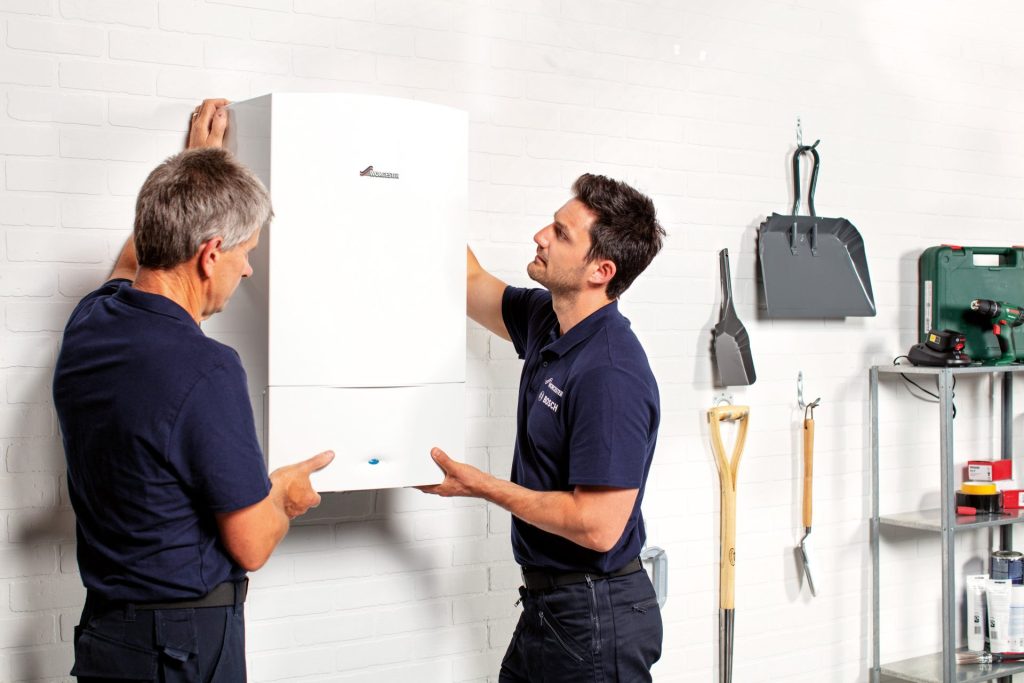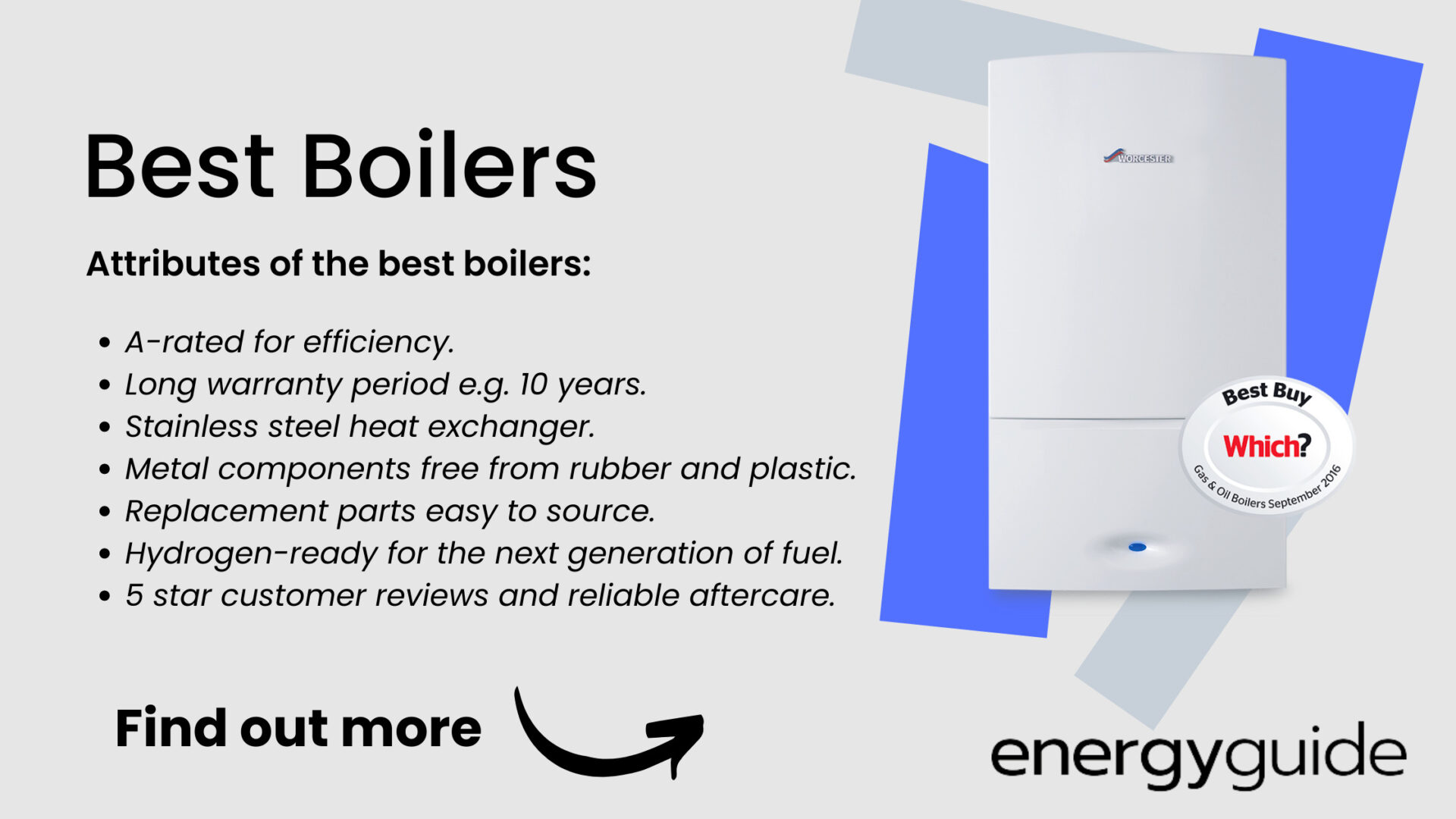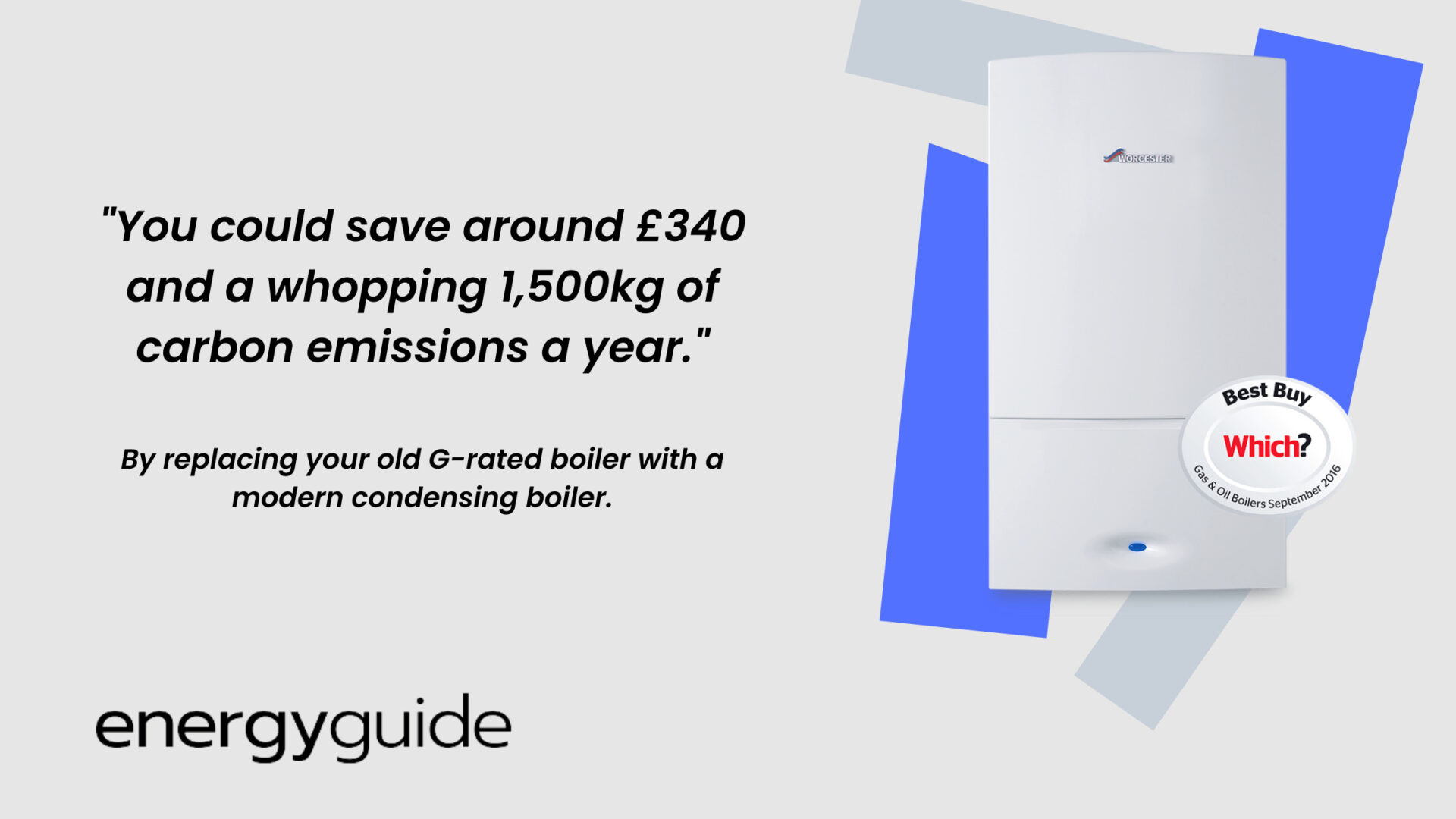Last Updated on May 21, 2024
Understanding the installation process can be useful if you want to replace or upgrade your boiler. This boiler installation guide will help you discover what to expect.
Your boiler is one of the most essential appliances in your home and is responsible for your heating and hot water.
Hot water and heating account for over 50% of annual energy bills, so installing a new, efficient boiler can significantly reduce energy expenses.
Installing a new boiler can be disruptive and inconvenient, and you’ll need help from a qualified Gas Safe heating engineer.
🔥 Need a New Boiler? Get a Fixed Price in 90 Seconds
Don’t waste time phoning around — Heatable shows you the best boiler deals online in under two minutes. No sales calls, no hidden fees, just instant prices from a trusted installer.
Get Your Fixed Price NowHowever, with the right insight and preparation, it doesn’t have to be.
This boiler installation guide explores the entire process, including when to replace your boiler, how to choose the right boiler, how to obtain quotes, and how to fit it.

Quick Takeaways:
- New boiler installation time and costs can vary depending on the boiler type and the job’s complexity.
- Finding a qualified and professional installer is a crucial step in boiler installation.
- Get at least three quotes from different installers to ensure you get the best value for money.
- Preparing your home for boiler installation makes things easier for everyone involved.
Wondering how much a new boiler costs? Check out our guide on options available if you need a new boiler but can’t afford it, as well as boilers on finance and government boiler grants here.
Boiler Installation Guide UK
When Is The Right Time To Get A Boiler Installation?
It’s worth considering a replacement if your boiler suffers from constant breakdowns, repairs, or intermittent issues.
Other signs that you should consider a modern boiler installation include:
- The warranty has expired, and repairs are costing a small fortune.
- Quotes to repair the boiler are very high, so replacing it can be more cost-effective.
- The manufacturer no longer produces replacement parts, making them difficult or impossible to find.
- The current boiler’s energy efficiency is decreasing. Efficiency decreases with age so you may notice an increase in energy usage and fuel bills.

If your boiler recently broke down or is on its last legs and has become expensive to repair or maintain, consider replacing it with a modern, more efficient one.
Remember, there’s not always the right time because when you need a new boiler, you need a new boiler.
However, if you plan a boiler installation before yours completely packs up, ensure you do it during the summer when you’re less reliant on heating and hot water.
Wondering which boiler manufacturers performed best? Check out our best boiler brands guide for the full rundown.
If you are trying to determine who the best boiler installation company is, check out our reviews of some of the most popular gas boiler replacement companies:
- Boiler Central Review.
- Warmzilla Review.
- Boxt Reviews.
- British Gas Boiler Review.
- iHeat Review.
- Eon Review.
- Heatable Review.
Step-by-Step Boiler Installation
Step 1 – Find A Qualified Installer
Finding a qualified and professional installer is a crucial step in boiler installation.
Boiler installation is not a DIY job. It involves working with gas and electricity, making it potentially hazardous if not handled properly.
UK regulations require all gas businesses and their engineers to be on the Gas Safe Register to carry out gas work legally.
Hiring a registered, certified, and reputable installer with the skills, experience, and credentials to install your boiler is vital.
An incorrect installation can damage your boiler and property and void your warranty or insurance. A Gas Safe engineer has qualifications to work on gas appliances and will ensure a safe, correct, and efficient installation.
If installing an oil boiler, ensure the installer has OFTEC registration.
Step 2 – Get A Quote
Once you find a qualified installation company or engineer, the next step is to get a quote.
The quote is crucial because it tells you how much you’ll need to finance the new boiler installation. The installer will help you determine whether a simple replacement boiler is appropriate or if a more suitable alternative is available.
It will include the cost of supplying and fitting the new boiler and any additional work needed. Most new boiler quotes feature a fixed price, which doesn’t change once quoted.
The Energy Savings Trust recommends getting at least three quotes from different installers to ensure you get the best value for money.
It’s worth asking about guarantees and warranties, as they can offer peace of mind in case of boiler damage.
The installer will also explain the control systems available and make recommendations based on the features you want and anything extra, such as smart functionality, weather compensation, or load compensation.
Some of the best installation companies allow you to get an online boiler quote in minutes. Confirm the quote and book an installation with the heating engineer, national company, or online supplier.
Step 3 – Home Preparation
You may need to prepare your home for installation before the heating engineer arrives.
It makes things easier for everyone involved and can include clearing the boiler installation area and ensuring enough space for the engineer to work safely.
Step 4 – Boiler Installation
Most installers offer next-day boiler installation across the UK where you can get a fixed price for your boiler today and have it installed tomorrow.
Depending on the job’s complexity, most boiler installations usually take 1 to 3 days to complete.
You should expect the engineer to complete the job within the day if it’s a straightforward swap — e.g., combi for a combi.
Some installations are inherently more complicated and will require more time to complete.
For example, converting your boiler to a different type, such as a combi or system, usually takes around two days.
Step 5 – Commissioning
Your engineer must commission your boiler after installing everything to standard.
The boiler commissioning procedure involves checking that the new boiler installation and setup are correct.
This helps ensure maximum efficiency from the boiler and can help establish steps to avoid common boiler issues.
You’ll need to be around for a run-through of the new boiler after installation.
Step 6 – Handover
After completing the above steps and ensuring your boiler runs efficiently, your engineer should complete a handover with you.
This includes explaining how your system works and any warranties it comes with.
They’ll also explain the regular maintenance checks you must complete during the boiler’s lifespan, such as bleeding a radiator or topping up the system’s pressure.
Ensure you’re as informed as possible, know how to operate the boiler, and use the controls.
Step 7 – Boiler Registration
Once the installation is complete, you or the engineer must register the boiler with the manufacturer.
This will ensure your warranty is valid and you have coverage if you experience any issues.
All Gas Safe installers/businesses must also notify the relevant local authorities within 30 days whenever they install a new gas appliance to comply with Gas Safe rules and Building Regulations.
The installer should give you a Building Regulations Certificate and a completed Benchmark Certificate to prove compliance. Ensure you ask if this doesn’t happen.
What Happens During A Boiler Installation?
Removal of The Old Boiler
The installer will start by removing your old boiler system. The time needed will depend on the existing system and the job’s complexity.
Flush/Clean
The installer must flush or clean the system after removing the old boiler.
A system flush before installation helps prevent debris or sludge from your old system from damaging your new boiler.
A chemical flush may be sufficient or a power flush may be required, depending on the system’s condition.
Upgrades/Changes To Pipework
The pipework may need to be changed or upgraded to install the new boiler. The pipework can be complex and may take up much of the installer’s time.
Fitting The Boiler
The heating engineer will install your new boiler after completing all the preparations.
They can fit the new boiler in the location of your old boiler or a new location. However, changing the location of the boiler will add extra time and costs to the process.
Smaller boiler systems can be placed in cupboards to disguise their appearance. It’s important to listen to the installer’s recommendations and advice on the best location for the boiler within your home.
Filter and Other Accessories Installation
It’s recommended that you install a filter alongside your boiler. This will collect any debris or sludge that builds up over time and protect your boiler.
It will also ensure that your system remains clean and runs efficiently.
The heating engineer will also install accessories such as a control, filling loops, and a flue.
What is the Average Cost of A Boiler Installation?
Unfortunately, there is not a set cost for a new boiler installation as there are various variables that will have an impact on the overall cost as follows:
- The type of boiler required
- The fuel type of the boiler chosen
- The boiler size or the power output of the model
- Whether or not a like-for-like boiler is being installed – If not, there could be pipework changes, relocation of elements of the system, or the removal or installation of water tanks for example
- The make and model of the new installation
- The installation costs by the engineer – costs are sometimes driven by where in the country the property is located or the size of the company due to installing the new boiler
- If any additional services are selected such as full heating chemical flushes or extended warranties
To obtain a tailored price for a boiler installation suitable for your property and household requirements, please request a quote online or via a reputable heating engineer.
Check out our video on how to vet boiler brands/models in the UK:
Did you know the efficiency of your boiler can impact the amount of energy it uses and ultimately impact your heating bill costs? Check out our guide to the best condensing boilers if you want to learn more.
You may also find our review of the best eco-friendly boilers of interest.
Check out our boiler brand price guides and comparisons:
- British Gas new boiler costs.
- How much is it to fit a new boiler?
- How much does a Vaillant boiler cost?
- Baxi boiler costs.
How Do I Choose The Right Boiler for My Property?
To select the most appropriate boiler for your property and household requirements, there will be a couple of important factors to consider such as:
- Which type of boiler is needed?
- What size boiler is required?
- Which boiler make and model is preferred?
Let’s take each question in turn:
Boiler Type
The first thing to establish would be the boiler type you require.
There is a range of different types of boilers available. However, the property type and household usage will determine the most suitable type.
As discussed, there may be additional costs involved with a switch between boiler types.
The most common types of boilers include:
- Combination boilers – Also called combi-boilers, they provide both heating and hot water, directly from the mains and don’t need a water tank. Combi-boilers are traditionally most suited to small and medium-sized properties with few bathrooms. However, these days, some powerful combi boilers can suit a moderate-sized property.
- Heat-only boilers – Heat-only boilers are more straightforward and provide heat energy directly into the radiators through a hot water cylinder.
- System boilers – A system boiler is a cylinder system that is an integrated, non-open valve system. It’s often recommended for properties with low water pressure. However, most system boilers require more space than a combi-boiler.
Got a common boiler problem? Check out our quick fix guide for boiler lockout, boiler ignition faults, boiler PCB faults, faulty diverter valves, and boiler timer issues.
Boiler Size
There are many different-sized boilers available these days. The size doesn’t relate to the physical measurement of the unit, but rather to the boiler’s output wattage.
A boiler’s power is measured in kilowatts (kW). The higher the kW, the greater the boiler’s capacity to meet your properties’ hot water and heating demands.
Boiler Brand and Model
The boiler brand and model selection tend to be based on personal preference.
There are plenty of boiler options available on the market, varying in price, energy rating, duration of the boiler warranty provided, and reliability.
It may be worth researching the best models for the boiler type needed online and checking customer reviews on Trustpilot to narrow down your choices.
Want to learn about all the factors that contribute to a boiler quote? Check out our boiler cost calculator to understand the latest boiler deals and what is factored into a gas boiler replacement estimate.

What size boiler is right for your home? If you are considering a combi boiler, it is largely determined by the number of radiators in your home.
Check out our complete guide to new boiler installation here if you are wondering about the best type of boiler for your home.
How much may a new boiler cost? Are you considering converting from a conventional to a combi boiler? Use our boiler installation cost calculator to get an estimation.
Boiler Installation Guide Summary
This boiler installation guide features the process you’ll likely follow when replacing your boiler. A boiler installation is a significant investment, so it’s crucial to ensure it’s done correctly. You can ensure your boiler installation runs safely and smoothly by choosing a qualified installer, preparing your home, and testing and registration your boiler.
If you have any further questions about boiler installations, please feel free to contact our team, who can advise you further.
Further reading:
- Smell of gas from boiler.
- Boiler leaking water.
- Boiler lockout.
- Boiler PCB faults.
- How to fix a faulty diverter valve.
- Compare BOXT boiler prices.
Sources and References
- https://energysavingtrust.org.uk/advice/boilers/
- https://www.gassaferegister.co.uk/help-and-advice/gas-safety-certificates-records/building-regulations-certificate/